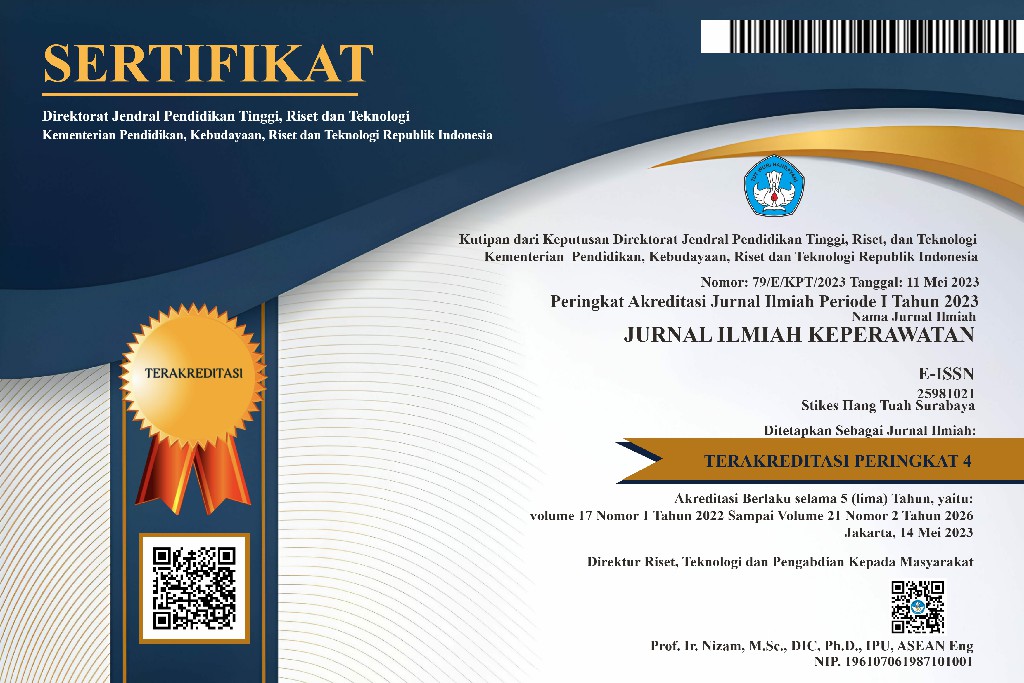Hubungan Perilaku Penderita dengan Kejadian Tuberkulosis di Wilayah Kerja Puskesmas Jagir Kecamatan Wonokromo Kota Surabaya
DOI:
https://doi.org/10.30643/jiksht.v12i2.30Keywords:
Knowledge, Attitude, Action, Behaviour, TuberculosisAbstract
Tuberculosis is a tropical contagious disease that is one of the targets of government programs in the eradication of infectious diseases. Indonesia is now ranked fifth with the highest burden of TB in the world. The results of TB prevalence surveys (2004) on knowledge, attitudes and behavior show that 96% of families care for family members with TB. 85% know that TB can be cured, 26% can name two major signs and symptoms of TB. The mode of transmission of TB is understood by 51% of families. The purpose of this study to determine the relationship of behavior with the incidence of tuberculosis in Puskesmas Jagir Kecamatan Wonokromo Kota Surabaya. The study was conducted November 1, 2014 - January 27 2015, the design of case control research, the risk factor of this study is the behavior of the patient, the effect is the incidence of tuberculosis. Respondents were cases of 10 people and control 26 people. Univariate analysis describes knowledge, attitude, action and behavior respondent. Bivariate analysis using contingency coefficient calculation result. The greater incidence of tuberculosis did not occur in respondents with favorable attitudes (p = 0.013, r = 0.383, OR = 7.667), respondents who carried out preventive measures of transmission (p = 0.001 r = 0.286 OR = 37.5) good (p = 0.001, r = 0.494, OR = 24,429). It is necessary to increase the willingness and behavior (knowledge, attitude and actions) of tuberculosis patients in an effort to reduce the incidence of tuberculosis, by increasing the dissemination of information not only to the patient but also to the community.
Â
Keyword: Knowledge, Attitude, Action, Behaviour, Tuberculosis
Downloads
References
Direktur Gerdunas TBC, Gerakan Terpadu Nasional (GERDUNAS) TBC, Kongres Nasional TBC I tahun 1999-2005
Friis R.H., 2009, Epidemiology for Publich Health Practice, fourth edition, Jones and Bartlett Publisher Sudbury Massachusetts Bosto-Toronto-London-Singapore
Gerakan Terpadu Nasional Penanggulangan Tuberkulosis/GERDUNAS-TBC. (2002c) Program Penanggulangan Tuberkulosis, Modul-1 Pelatihan Penangulangan Tuberkulosis Nasional, Jakarta.
Grange John M.. Zumla Alimuddin I., 2009, Tuberkulosis-Manson’s Tropical Diseases,edisi 22
Kanchanaraksa S., 2008, Case-Control Study, Johns Hopkins Bloomberg School of Publich Health, Johns Hopkins University
Kementerian Kesehatan Republik Indonesia Direktorat Jenderal Pengendalian Penyakit Dan Penyehatan Lingkungan, 2011, Strategi Nasional Pengendalian Tuberkulosis di Indonesia 2010-2014, Jakarta.
Kementerian Kesehatan RI, 2013, Pedoman Nasional Pelayanan Kedokteran Tata Laksana Tuberkulosis, Jakarta
Kementerian Kesehatan Republik Indonesia Direktorat Jenderal Pengendalian Penyakit Dan Penyehatan Lingkungan, 2014, Pedoman Nasional Pengendalian Tuberkulosis, cetakan tahun 2014, Jakarta
Keputusan Menteri Kesehatan Republik Indonesia Nomor 364/MENKES/SK/V/2009 tentang Pedoman Penanggulangan Tuberkulosis (TB)
Konferensi International Union Against Tuberkulosis and Lung Disease, Warta Tuberkulosis Indonesia - Volume 22 - Januari 2013 - 22/I/2013
Lapau B., 2013, Prinsip dan Metode Epidemiologi, FKUI, Jakarta
Lemeshow S., Hosmer D.W., Klar Jr J., Lwanga S.K., 1990, Adequacy of Sample Size in Health Studies, World Health Organization, Published on behalf of the World Health Organization by JOHN WILEY & SONS Chichester- New York-Brisbane-Toronto-Singapore
Machin D., Campbell M.J., Walters S. J., 2007, Medical Statistics, fourth edition, A Textbook for the Health Sciences, John Wiley and Sons, Ltd
Matasik M., Oktavian A.,Ruru Y., Senorita, Mirino Y., Tarigan L.H., Tarigan, Alisjahbana B., Faktor-faktor yang mempengaruhi kepatuhan pasien TB yang diobati dengan srategi DOTS di kota Jayapura Provinsi Papua tahun 2008, Kumpulan Hasil Riset Operasional Tuberkulosis Tahun 2005 – 2009 Kelompok Kerja Riset Operasional Tuberkulosis (Tuberkulosis Operational Research Group) Direktorat Jenderal PP dan PL Kementerian Kesehatan RI
N. Shetty, M. Shemko, M. Vaz, G. D’Souza, An epidemiological evaluation of risk factors for tuberkulosis in South India: a matched case control study St John’s National Academy of Health Sciences, Bangalore, India International Tuberkulosis Lung Disease 2006
Ning Rintiswati, Suharna, Susilawati, Purwanta, Yanri Wijayanti, Yodi Mahendradhata, Marieke Van der Werf, Perilaku pencarian pengobatan penderita TB di Yogyakarta, Kumpulan Hasil Riset Operasional Tuberkulosis Tahun 2005 – 2009, Kelompok Kerja Riset Operasional Tuberkulosis (Tuberkulosis Operational Research Group), Direktorat Jenderal PP dan PL Kementerian Kesehatan RI
Noor Nasry N., 2008, Epidemiologi, Edisi Revisi, Rineka Cipta Jakarta
Notoadmodjo S., 2012, Metodologi Penelitian Kesehatan, Rineka Cipta, Jakarta.
Peraturan Menteri Kesehatan RI Nomor 565/MENKES/PER/III/2011 tentang Strategi Nasional Pengendalian Tuberkulosis Tahun 2011-2014, Jakarta
Pertemuan Monitoring dan Evaluasi Program Pengendalian TB di Lapas/Rutan Warta Tuberkulosis Indonesia - Volume 22 - Januari 2013 - 22/I/2013
Perwitasari D., Azhar K., 2013, Kondisi Fisik Rumah Dan Perilaku Dengan Prevalensi TB Paru Di Propinsi DKI Jakarta, Banten Dan Sulawesi Utara, Media Litbangkes Vol 23 No. 4, Des 2013, 172-181
Prasad R., Suryakant, Garg R., Singhal S., Dawar R., Agarwall G. G., A case-control study of tobacco smoking and tuberkulosis in India, Department of Pulmonary Medicine, Chhatrapati Sahuji Maharaj Medical University (Erstwhile K. G. Medical University), 1Department of Statistics, Lucknow University, Lucknow, India Annals of Thoracic Medicine - Vol 4, Issue 4, October-December 2009
Sastroasmoro S., Ismael S., 2008, Dasar-dasar Metodologi Penelitian Klinis, EGC, Jakarta.
United States Agency for International Development (USAID), 2006, International Standards For Tuberkulosis Care Diagnosis Treatment Public Health, Tuberkulosis Coalition For Technical Assistance. International Standards for Tuberkulosis Care (ISTC). The Hague: Tuberkulosis Coalition for Technical Assistance.
World Health Organization, 2013, Global Tuberkulosis Report 2013, 2010, Treatment of Tuberkulosis Guidelines, Fourth edition
Downloads
Published
Issue
Section
License
Authors retain copyright and grant the journal right of first publication with the work simultaneously licensed under a Creative Commons Attribution-ShareAlike 4.0 License that allows others to share the work with an acknowledgment of the work's authorship and initial publication in this journal.












